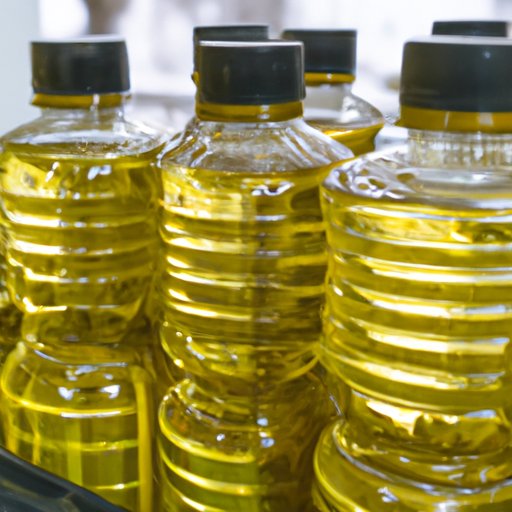Introduction
Cooking oil is a staple ingredient in many kitchens. It helps bring flavor to dishes, adds moisture, and helps prevent food from sticking to cookware. But when it comes to storing cooking oil, it’s important to understand its shelf life and expiration date. In this article, we will explore the shelf life of cooking oil, storage tips, signs of spoilage, and more.

Analyzing the Shelf Life of Cooking Oil
When it comes to understanding how long cooking oil lasts, it’s important to consider two factors: whether the oil is unopened or opened. Unopened cooking oil can last for up to two years if stored properly, while opened cooking oil has a much shorter shelf life.
Unopened Cooking Oil
Unopened cooking oil typically has a shelf life of two years, as long as it’s stored in a cool, dark place. However, certain types of cooking oil, such as olive oil, may have a shorter shelf life, so it’s important to check the label before using.
Opened Cooking Oil
Once cooking oil has been opened, it has a much shorter shelf life. Depending on the type of oil, it can last anywhere from one month to six months. The shelf life also depends on how the oil is stored and handled.
Examining How Long Cooking Oil Lasts Once Opened
The shelf life of opened cooking oil is dependent on a few factors, including the type of oil, how it’s stored, and how often it’s used. Let’s take a closer look at these factors and their impact on the shelf life of cooking oil.
Factors Affecting Shelf Life
The type of cooking oil you use will have a big impact on its shelf life. For example, olive oil has a shorter shelf life than vegetable oil because it is more susceptible to oxidation and rancidity. Other factors that affect the shelf life of cooking oil include temperature, light exposure, and air exposure.
Storage Guidelines
To maximize the shelf life of your cooking oil, it’s important to store it properly. The best way to store cooking oil is in a cool, dark place, such as a pantry or cupboard. You should also make sure the container is tightly sealed to keep out air and light. Additionally, you should avoid storing cooking oil near sources of heat, such as stoves or radiators.

Investigating the Signs of Spoiled Cooking Oil
If your cooking oil has been stored improperly or kept for too long, it may be spoiled. It’s important to recognize the signs of spoilage so you don’t accidentally consume spoiled oil. Here are some visual cues and taste/smell tests you can use to determine if your cooking oil has gone bad.
Visual Cues
One of the easiest ways to tell if cooking oil has gone bad is to inspect it visually. If the oil has changed color or texture, it’s likely spoiled and should not be consumed. Additionally, if there are any signs of mold or other contaminants, the oil should be thrown away immediately.
Taste and Smell Tests
Another way to check if cooking oil has gone bad is to taste or smell it. If the oil has an unpleasant smell or a bitter or rancid taste, it’s likely spoiled and should not be consumed.
Exploring Ways to Extend the Life of Cooking Oil
Although cooking oil has a limited shelf life, there are a few things you can do to extend its longevity. Here are some tips for storing cooking oil to help it last longer.
Storing in Cool, Dry Place
The best way to store cooking oil is in a cool, dry place, such as a pantry or cupboard. This will help protect the oil from heat, light, and air exposure, which can cause it to spoil more quickly.
Refrigeration
Some types of cooking oil, such as olive oil, can be stored in the refrigerator to extend their shelf life. However, it’s important to note that refrigerated oil may become cloudy or solidify, so it should be allowed to come to room temperature before using.
Rotation
It’s also a good idea to rotate your cooking oils. This means using the oldest oil first and replacing it with a fresh bottle when necessary. This will help ensure that you always have fresh, high-quality oil on hand.

Understanding the Benefits of Rotation Cooking Oils
Rotating your cooking oils can have several benefits. First, it gives you access to a variety of flavors and textures. Different types of oil have different flavor profiles, so rotating your oils can add new dimensions to your cooking. Additionally, rotating your oils ensures that you’re using the freshest ingredients possible, which can improve the quality and taste of your dishes. Finally, rotating your oils can give you access to healthier options, such as cold-pressed or organic oils.
Conclusion
Cooking oil is an essential ingredient in many recipes, but it’s important to understand its shelf life and expiration date. Unopened cooking oil typically has a shelf life of two years, while opened cooking oil has a much shorter shelf life. To maximize the shelf life of your cooking oil, it’s important to store it in a cool, dark place and rotate it regularly. Additionally, you should be aware of the signs of spoilage, such as changes in color, texture, smell, and taste. By following these tips, you can ensure that your cooking oil stays fresh and flavorful for as long as possible.


